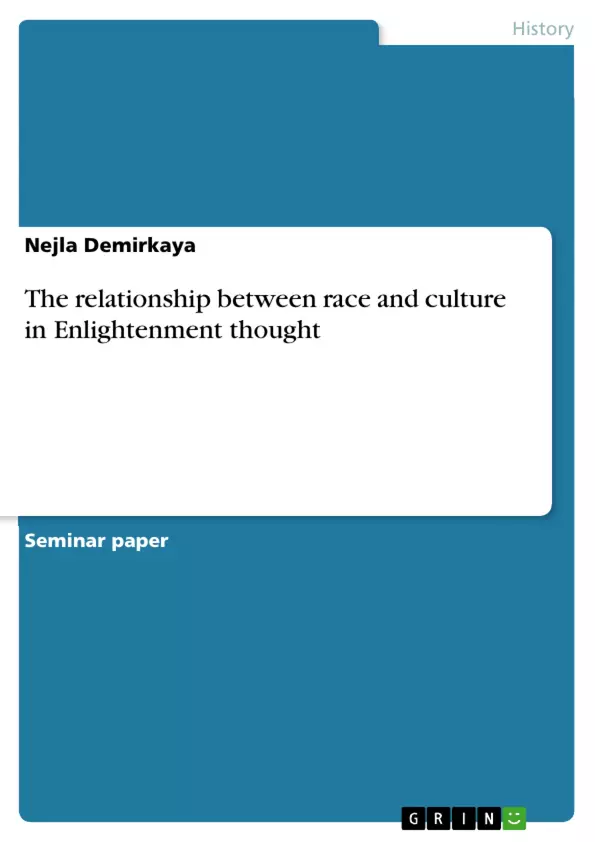This paper will revolve around the question of how the concepts of race and culture – encompassing the entirety of human behaviour, social practices, expressive forms and technologies – or civilisation – signifying the former’s upscaled and yet more complex version – might be interlinked in the anthropological and philosophical writings of four renowned German scholars: Immanuel Kant, Johann Gottfried Herder, Christoph Meiners and Johann Friedrich Blumenbach.
To this end, the intellectual preconditions for culture and civilisation need to be taken into account as well. All four of these scholars were deliberately chosen not only due to their pioneering contributions to scientific race and cultural theories, but also the controversial, at times perhaps even acrimonious debates they were engaged in with each other.
Scholarly activity of the Enlightenment could be said to have carried the impulse to classify and organise the world around us and even beyond our immediate reach to extremes. However, tied to classification systems of any kind are incongruities and generalisations that do not necessarily, if at all, measure up to reality. Perhaps it is in these generalising descriptions, especially of foreign peoples and cultures, where one’s own self-conception surfaces most clearly. In order to gain insight into but a small fraction of the Enlightened mind, the analysis of some of the most influential and remarkable writings about the racial division of humankind could be a useful starting point.
Inhaltsverzeichnis (Table of Contents)
- Introduction
- Race and civilisation put into context
- Scientific racialism in the eighteenth century
- From barbarism to civilisation
- The relationship between race and culture in Enlightenment thought
- Immanuel Kant (1724-1804)
- Johann Gottfried Herder (1744-1803)
- Christoph Meiners (1747-1810)
- Johann Friedrich Blumenbach (1752-1840)
- Conclusion
Zielsetzung und Themenschwerpunkte (Objectives and Key Themes)
This paper investigates the relationship between the concepts of race and culture in Enlightenment thought, focusing on four prominent German scholars: Immanuel Kant, Johann Gottfried Herder, Christoph Meiners, and Johann Friedrich Blumenbach. The goal is to understand how these thinkers viewed the relationship between racial classification and cultural development, particularly in the context of encounters with non-European peoples.
- The emergence and development of scientific racialism in the 18th century.
- The role of Enlightenment thought in classifying and organizing the world.
- The interplay of concepts like "culture," "civilisation," and "barbarism" in understanding different races and nations.
- The influence of perceived cultural development on racial classification.
- The intellectual preconditions for culture and civilization within the context of racial theories.
Zusammenfassung der Kapitel (Chapter Summaries)
- Introduction: The paper establishes its central question: How did Enlightenment scholars interlink the concepts of race and culture in their writings? It highlights the problematic terminology used by these thinkers and clarifies the usage of terms like "culture" and "civilization." The paper outlines its methodology, including the use of primary sources and relevant academic literature.
- Race and civilisation put into context: This chapter explores the inherent tension within Enlightenment thought between classification and universalistic ideals, highlighting the impact of increased global contact on European self-perception. It delves into the development of scientific racialism in the 18th century, outlining the rise of anthropology, physiognomy, and phrenology as disciplines contributing to the racial division of humanity.
- Scientific racialism in the eighteenth century: This section delves further into the emergence of scientific racialism in the 18th century, highlighting the shift towards classifying human populations based on observable physical characteristics. It discusses the concept of "race" as representing "varieties" or "subspecies" of humankind, setting the stage for the analysis of specific thinkers.
Schlüsselwörter (Keywords)
The key terms and concepts explored in this paper include: race, culture, civilisation, barbarism, Enlightenment, scientific racialism, anthropology, physiognomy, phrenology, monogenism, and the classification of humans along racial lines.
Frequently Asked Questions
Which scholars are discussed in this paper on Enlightenment thought?
The paper focuses on four German scholars: Immanuel Kant, Johann Gottfried Herder, Christoph Meiners, and Johann Friedrich Blumenbach.
What is the central question regarding race and culture?
The paper explores how these 18th-century thinkers interlinked physical racial classification with the level of cultural or civilisational development.
How did the Enlightenment influence the classification of humans?
The Enlightenment brought a strong impulse to organize the world through systems like anthropology, physiognomy, and phrenology.
What is the difference between "culture" and "civilisation" in this context?
"Culture" encompasses human behavior and social practices, while "civilisation" is viewed as a more complex or "upscaled" version of these forms.
What roles did monogenism and polygenism play?
The paper touches upon scientific racialism and whether humans were seen as one species with varieties or as distinct origins.
- Citar trabajo
- Nejla Demirkaya (Autor), 2015, The relationship between race and culture in Enlightenment thought, Múnich, GRIN Verlag, https://www.grin.com/document/430893



